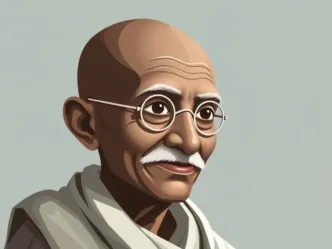Write a compelling Mahatma Gandhi essay. Learn about his life, non-violence, India’s independence struggle, & lasting legacy. Topics & tips included. Explore Mahatma Gandhi’s life, philosophy of non-violence (Satyagraha), and crucial role in India’s freedom struggle in this comprehensive essay.
 Mahatma Gandhi Essay: The Father of the Nation
Mahatma Gandhi Essay: The Father of the Nation 
Mohandas Karamchand Gandhi, fondly known as Mahatma Gandhi, was a pivotal figure in India’s struggle for independence ![]() . Born on October 2, 1869, in Porbandar, Gujarat
. Born on October 2, 1869, in Porbandar, Gujarat ![]() , Gandhi’s life was a testament to the power of non-violence and truth
, Gandhi’s life was a testament to the power of non-violence and truth ![]() .
.
Early Life and Education
Gandhi’s early life was marked by simplicity and humility ![]() . He studied law in London
. He studied law in London ![]() , where he was exposed to Western ideas and values
, where he was exposed to Western ideas and values ![]() . However, it was his experiences in South Africa
. However, it was his experiences in South Africa ![]() , where he faced racial discrimination
, where he faced racial discrimination ![]() , that shaped his philosophy of non-violent resistance
, that shaped his philosophy of non-violent resistance ![]() .
.
The Birth of Non-Violence
Gandhi’s methods of non-violence and civil disobedience were revolutionary ![]() . He believed that the power of the people could be harnessed to challenge unjust laws and institutions
. He believed that the power of the people could be harnessed to challenge unjust laws and institutions ![]() . Through peaceful protests, marches, and hunger strikes
. Through peaceful protests, marches, and hunger strikes ![]() , Gandhi inspired a nation to rise up against British rule
, Gandhi inspired a nation to rise up against British rule ![]() .
.
India’s Struggle for Independence
Gandhi’s leadership played a crucial role in India’s fight for freedom ![]() . The Salt March
. The Salt March ![]() , the Quit India Movement
, the Quit India Movement ![]() , and numerous other campaigns showcased his unwavering commitment to non-violence
, and numerous other campaigns showcased his unwavering commitment to non-violence ![]() . The British Empire, once thought invincible
. The British Empire, once thought invincible ![]() , was finally forced to grant India independence in 1947
, was finally forced to grant India independence in 1947 ![]() .
.
Philosophy and Legacy
Gandhi’s philosophy of Sarvodaya (welfare of all) and Swaraj (self-rule) continues to inspire people worldwide ![]() . His emphasis on simple living, self-sufficiency, and community development
. His emphasis on simple living, self-sufficiency, and community development ![]() remains relevant today. Gandhi’s message of love, compassion, and non-violence is a beacon of hope in a world torn apart by conflict and hatred
remains relevant today. Gandhi’s message of love, compassion, and non-violence is a beacon of hope in a world torn apart by conflict and hatred ![]() .
.
Assassination and Legacy
Gandhi’s life was tragically cut short by an assassin’s bullet ![]() on January 30, 1948
on January 30, 1948 ![]() . However, his legacy lives on through the countless lives he touched
. However, his legacy lives on through the countless lives he touched ![]() . Today, Mahatma Gandhi is revered as the Father of the Nation
. Today, Mahatma Gandhi is revered as the Father of the Nation ![]() , and his teachings continue to guide us toward a more peaceful and just world
, and his teachings continue to guide us toward a more peaceful and just world ![]() .
.
Conclusion
Mahatma Gandhi’s life was a testament to the power of non-violence, truth, and simplicity ![]() . His unwavering commitment to his principles inspired a nation to fight for freedom and continues to inspire people worldwide
. His unwavering commitment to his principles inspired a nation to fight for freedom and continues to inspire people worldwide ![]() . As we reflect on his life and legacy, we are reminded of the transformative power of love, compassion, and non-violence
. As we reflect on his life and legacy, we are reminded of the transformative power of love, compassion, and non-violence ![]() .
.







